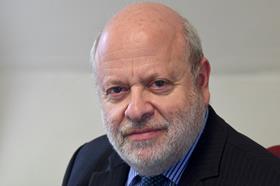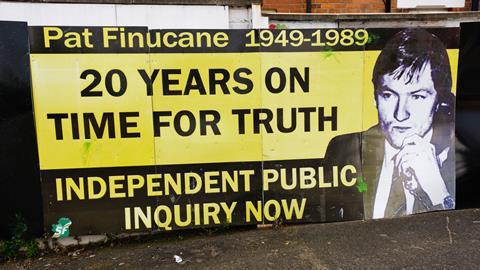Last week, the Secretary of State for Northern Ireland announced a public inquiry into the assassination in 1989 of Northern Irish solicitor Pat Finucane. The inquiry chair will be appointed as soon as possible, as will its terms of reference.

Much has taken place in the courts and parliament over the 35 years since the assassination, through efforts by the Finucane family to arrive at the truth behind the murder. I have written about it a couple of times before (see box below).
Without rehearsing all the facts again, Pat Finucane was shot 14 times while having supper with his wife and family. His wife was also injured.
An independent reviewer into state involvement in his murder stated: ‘… I am left in significant doubt as to whether Patrick Finucane would have been murdered by the UDA in February 1989 had it not been for the different strands of involvement by elements of the state….’
David Cameron, when prime minister, publicly apologised to the family in the House of Commons and said that there were ‘frankly shocking levels of collusion’ between the assassins and agents of the state.
Despite the government promise of a public inquiry years ago, and despite the Supreme Court in 2019 (echoing the European Court of Human Rights (ECtHR) in 2003) deciding that there had never been an inquiry into the death of Pat Finucane which satisfied Article 2 of the European Convention on Human Rights (ECHR), there has until now been no proper inquiry into his death. (Article 2 deals with the inadequate investigation into circumstances of death.)
Last week’s announcement did not come out of the blue. This July, a Court of Appeal ruling in Belfast gave the government weeks to deal with the issue. The judge allowed the government and Mrs Finucane three weeks to agree on an Article 2 compliant investigation into Mr Finucane's killing. If there would be no agreement on what to do, a further three weeks would be granted to allow parties to submit their own proposals, and ‘In the unlikely event that the court is unable to choose either of the choices put forward, the court reserves the right to order its own Article 2 compliant process for the investigation into the callous and brutal murder of Mr Finucane as a last resort’. So the Secretary of State’s hand was forced.
The decision raises complex other issues, too. In brief, the Independent Commission for Reconciliation and Information Recovery (ICRIR) is supposed to deal with such cases. It was established by the Northern Ireland Troubles (Legacy and Reconciliation) Act 2023 passed by the last government. The current government pledged to scrap the Act, which is widely unpopular in Northern Ireland, but has now changed its mind and will seek to reform the ICRIR. To have an independent inquiry into the death of Pat Finucane, for whatever sound reasons, undermines both the government’s current policy and the standing of the ICRIR. If Pat Finucane can have an independent inquiry, why not others?
But we don’t need to have a view on these many complex issues, and a knowledge of the knotted problems thrown up by the Troubles, to welcome this independent inquiry. That is because it will be specifically into the assassination of a lawyer.
As I have argued before, we look foolish when we as lawyers preach – as we do – to other countries to investigate the murders and abuse of their lawyers, if we don’t keep to similar high standards ourselves. Practically every month the Law Society sends letters to foreign governments and foreign bars urging them to investigate this or that abuse. I commend the Law Society for doing that. But we should support similar action when there has been abuse of lawyers here at home (in this case, a brutal assassination), to avoid accusations of hypocrisy.
Over the years, others have written to the UK government. For instance, in 2020 over 25 members of the US Congress wrote to the then prime minister urging him ‘to establish an independent public inquiry into state collusion in the murder of human rights attorney Patrick Finucane’. Other organisations have done the same.
Patrick Finucane was not the only solicitor who was assassinated during the Troubles. Rosemary Nelson was killed by a bomb under her car in 1999. There was a public inquiry in her case. This found no evidence of state agencies directly facilitating her murder, but omissions by the Royal Ulster Constabulary and Northern Ireland Office which rendered her more at risk and more vulnerable, concluding that the state had failed to take reasonable and proportionate steps to safeguard her life.
We don’t yet know what facts may emerge from the Finucane inquiry. But at least we are now applying the same standards to ourselves as we so often request of others.
Jonathan Goldsmith is Law Society Council member for EU & International, chair of the Law Society’s Policy & Regulatory Affairs Committee and a member of its board. All views expressed are personal and are not made in his capacity as a Law Society Council member, nor on behalf of the Law Society
































1 Reader's comment